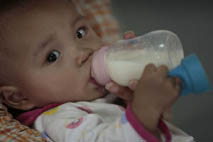However, unlike the Fuyang milk powder incident, which involved shoddy products made by unlicensed enterprises, the culprit this time was a leading dairy products producer – the Sanlu Group – which is one of China's top 500 enterprises. With 18 percent of the milk powder market in 2007, the Sanlu Group ranked first nationwide in terms of milk powder sales for over a decade. The incident shocked the Chinese dairy products industry and the public at large, causing a near panic as desperate parents sought medical treatment for their infants whom they suspected of having been poisoned.
 |
| A baby who had drunk tainted Sanlu infant formula milk powder. |
In early 2008, the media revealed a spate of infant kidney stone cases in several provinces, autonomous regions and municipalities. Most of the patients were five to 11 months old, and a number of them developed renal insufficiency. Kidney stones are rare in children, and further analysis revealed that all had consumed infant milk powder made by the Sanlu Group. On September 11, the Ministry of Health declared: "It is suspected that the infant formula milk powder made by Shijiazhuang Sanlu Group Co., Ltd. was contaminated by melamine." That same evening, Sanlu Group admitted it would recall 700 tons of milk powder contaminated by melamine, all of it produced before August 6, 2008, after conducting its own analysis.
Melamine is a downstream product of urea, widely used in timber processing, plastics, paint, papermaking and textiles. Long-term intake of melamine can harm the human reproductive and urinary systems, causing stones in the bladder and kidneys, and even bladder cancer. In 2007, the pet food contamination incident in the United States was caused by 6.6 percent melamine in wheat gluten. Adding this chemical to food can increase the indicator of protein content in food in testing. In the case of the Sanlu-brand infant formula milk powder, the content of melamine in the milk powder was as high as 2,563 mg/kg.
The Chinese government immediately started a national I-class response to a serious food safety incident. A 16-member leading group to handle the Sanlu scandal was established, comprising leaders from the Ministry of Health and functional departments from national and local governments to examine the incident from various aspects, such as production, circulation and sales, and to make the utmost effort to treat the infants who suffered from the contaminated milk powder.
